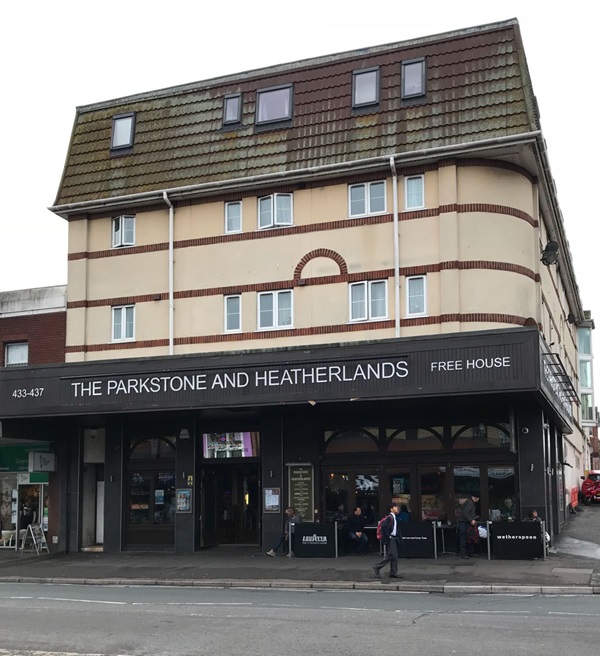Pub history
The Parkstone and Heatherlands
Discover the history of rock band King Crimson.

This building is better known to Winton’s older residents as the long-standing Co-op, the original of which (on this site) was a branch of the Parkstone and Heatherlands Society. Following a public meeting attended by 100 people, in May 1903, the society’s new store opened for business the following September. Molesworth House, as the store was then called, was replaced by a high, domed building, which became a familiar landmark. The dome was later removed and the building refaced.
A print and text about kings and earls from the area

The text reads: Until the turn of the 18th century, what is now Bournemouth (and Winton) was an extensive area of wild heathland. Originally, it was the royal estate of Edward the Confessor, and later part of the Liberty of Westover.
Later still, the Earl of Malmesbury was one of the leading landowners in what was to become Winton. He started life as James Harris and became one of the great diplomats of the 18th century. Harris was rewarded with an earldom.
His grandson, the 3rd Earl of Malmesbury, served as foreign secretary and Lord Privy Seal (in the 1850s). The fifth earl gifted the land for Winton Recreation Ground, which covered 16 acres and was officially opened on 27 September 1906.
Above: James Harris, 1st Earl of Malmesbury
An illustration and text about King Crimson

The text reads: Two of Winton’s sons, Michael and Peter Giles, were founder members of the progressive rock band King Crimson. In the early 60s, both played in the local band Trendsetters Ltd, until they formed their own group with Wimborne’s Robert Fripp. When Peter Giles left in 1968, another local musician stepped in – Greg Lake, later one third of Emerson, Lake and Palmer. King Crimson became a major force in progressive rock in the late 60s and 70s, with a worldwide reputation. ‘In the Court of the Crimson King’ was one of the most significant LPs of its day. The band has a high place in the roll call of innovative rock music, and some of its members, including the Giles brothers, reformed as ‘21st Century Schizoid’ in 2002.
An illustration of Robert Owen, whose ideas lay behind the Co-operative movement
A photograph of the Rochdale Pioneers and the first Co-operative store, Parkston

The Rochdale Pioneers were the original members of the first Co-operative Society, founded in 1844.
Photographs of the original members of the Co-operative Wholesale Society

A photograph of the Parkstone and Bournemouth Co-op on opening day, 10 July 1912

A photograph and text about Freddie Mills

The text reads: Born in Parkstone, the world light-heavyweight champion from 1948 to 1950 trained at the old Gospel Hall in Winton.
A map and photograph of Winton in 1903 and 1900, respectively

External photograph of the building – main entrance





